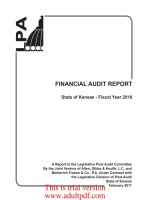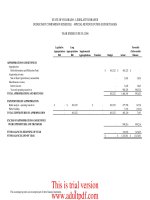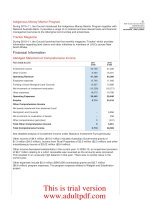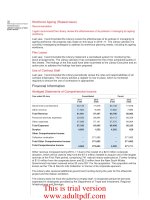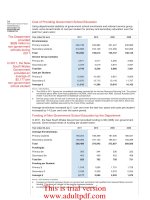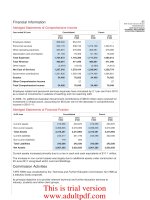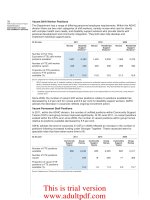LEGISLATIVE DEPARTMENT, STATE OF COLORADO FINANCIAL AUDIT REPORT YEARS ENDED JUNE 30, 2003 AND 2002_part5 pot
Bạn đang xem bản rút gọn của tài liệu. Xem và tải ngay bản đầy đủ của tài liệu tại đây (42.37 KB, 7 trang )
LEGISLATIVE DEPARTMENT, STATE OF COLORADO
COMBINING BALANCE SHEETS - SPECIAL REVENUE FUNDS
JUNE 30, 2003 AND 2002
Ballot Ballot
Public Publication Public Publication
Buildings Revolving Buildings Revolving
Trust Fund Fund Trust Fund Fund 2003 2002
ASSETS
Cash 13,286$ 734,806$ 5,833$ 214,973$ 748,092$ 220,806$
TOTAL ASSETS 13,286$ 734,806$ 5,833$ 214,973$ 748,092$ 220,806$
LIABILITIES
Accounts payable 31$ 225$ 32$ 278$ 256$ 310$
TOTAL LIABILITIES 31 225
32 278
256
310
FUND BALANCES
Reserved for specific purpose 13,255 734,581
5,801 214,695
747,836
220,496
TOTAL LIABILITIES AND FUND BALANCES 13,286$ 734,806$ 5,833$ 214,973$ 748,092$ 220,806$
Totals
2003 2002
37
This is trial version
www.adultpdf.com
LEGISLATIVE DEPARTMENT, STATE OF COLORADO
COMBINING SCHEDULES OF REVENUES, EXPENDITURES, AND CHANGES IN FUND BALANCES - SPECIAL REVENUE FUNDS
YEARS ENDED JUNE 30, 2003 AND 2002
Ballot Ballot
Public Publication Public Publication
Buildings Revolving Buildings Revolving
Trust Fund Fund Trust Fund Fund 2003 2002
REVENUES
Sale of State Capitol history memorabilia 2,678$ -$
3,110$ -$
2,678$
3,110$
Miscellaneous Revenue
Interest income - 71,627
- 41,475
71,627
41,475
Miscellaneous revenue 5,000 -
15 -
5,000
15
TOTAL REVENUE 7,678 71,627
3,125 41,475
79,305
44,600
EXPENDITURES
Purchased services 100 1,207,328
- 159,121
1,207,428
159,121
Operating expenditures 124 297,413
194 241,851
297,537
242,045
TOTAL EXPENDITURES 224 1,504,741
194 400,972
1,504,965
401,166
EXCESS (DEFICIENCY) OF REVENUES
OVER EXPENDITURES 7,454 (1,433,114)
2,931 (359,497)
(1,425,660)
(356,566)
OTHER FINANCING SOURCES
Operating Transfer In - 1,953,000
-
429,443
1,953,000
429,443
TOTAL OTHER FINANCING SOURCES - 1,953,000
- 429,443
1,953,000
429,443
EXCESS OF REVENUES OVER
EXPENDITURES AND OTHER FINANCING
SOURCES 7,454 519,886
2,931 69,946
527,340
72,877
FUND BALANCES, BEGINNING OF YEAR 5,801 214,695
2,870 144,749
220,496
147,619
FUND BALANCES, END OF YEAR 13,255$ 734,581$
5,801$ 214,695$
747,836$
220,496$
Totals
2003 2002
38
This is trial version
www.adultpdf.com
39
REPORT ON COMPLIANCE AND ON INTERNAL CONTROL OVER FINANCIAL REPORTING
BASED ON AUDITS OF FINANCIAL STATEMENTS
PERFORMED IN ACCORDANCE WITH GOVERNMENT AUDITING STANDARDS
Members of the Legislative Audit Committee:
We have audited the financial statements of the Legislative Department, State of Colorado (the “Department”)
as of June 30, 2003 and 2002, and for the years then ended, and have issued our report thereon dated August
22, 2003. We conducted our audits in accordance with auditing standards generally accepted in the United
States of America and the standards applicable to financial audits contained in Government Auditing
Standards, issued by the Comptroller General of the United States.
Compliance
As part of obtaining reasonable assurance about whether the Department’s financial statements are free of
material misstatement, we performed tests of its compliance with certain provisions of laws, regulations, and
contracts, noncompliance with which could have a direct and material effect on the determination of financial
statement amounts. However, providing an opinion on compliance with those provisions was not an objective
of our audit and, accordingly, we do not express such an opinion. The results of our tests disclosed no
instances of noncompliance that are required to be reported under Government Auditing Standards.
Internal Control Over Financial Reporting
In planning and performing our audits, we considered the Department’s internal control over financial
reporting in order to determine our auditing procedures for the purpose of expressing our opinion on the
financial statements and not to provide assurance on the internal control over financial reporting. Our
consideration of the internal control over financial reporting would not necessarily disclose all matters in the
internal control over financial reporting that might be material weaknesses. A material weakness is a condition
in which the design or operation of one or more of the internal control components does not reduce to a
relatively low level, the risk that misstatements in amounts that would be material in relation to the financial
statements being audited may occur and not be detected within a timely period by employees in the normal
course of performing their assigned functions. We noted no matters involving the internal control over
financial reporting and its operation that we consider to be material weaknesses.
This report is intended solely for the information and use of the members of the Legislative Audit Committee
of the State of Colorado and management of the Department and is not intended to be and should not be used
by anyone other than these specified parties. However, this report is a matter of public record and its
distribution is not limited.
August 22, 2003
This is trial version
www.adultpdf.com
40
August 22, 2003
Members of the Legislative Audit Committee:
We have audited the financial statements of the Legislative Department, State of Colorado (the “Department”)
as of June 30, 2003 and June 30, 2002, and for the years then ended, and have issued our report thereon dated
August 22, 2003. Professional standards require that we provide you with the following information related to
our audits.
Our Responsibility under Auditing Standards Generally Accepted in the
United States of America and Government Auditing Standards
Our responsibility, as described by professional standards, is to plan and perform our audits to obtain
reasonable, but not absolute, assurance that the financial statements are free of material misstatement and are
fairly presented in accordance with accounting principles generally accepted in the United States of America.
Because of the concept of reasonable assurance and because we did not perform a detailed examination of all
transactions, there is a risk that material errors, fraud, or other illegal acts may exist and not be detected by us.
As part of our audits, we considered the internal control of the Department. Such considerations were solely
for the purpose of determining our audit procedures and not to provide any assurance concerning internal
control.
As part of obtaining reasonable assurance about whether the financial statements are free of material
misstatement, we performed tests of the Department’s compliance with certain provisions of laws, regulations,
and contracts. However, the objective of our tests was not to provide an opinion on compliance with such
provisions.
Significant Accounting Policies
Management has the responsibility for selection and use of appropriate accounting policies. In accordance
with the terms of our engagement letter, we advise management about the appropriateness of accounting
policies and their application. The significant accounting policies used by the Department are described in
Note 2 to the financial statements. As described in Note 2 to the financial statements, the Department adopted
Governmental Accounting Standards Board Statement No. 34, Basic Financial Statements – and
Management’s Discussion and Analysis – for State and Local Governments and Statement No. 37, Basic
Financial Statements – and Management’s Discussion and Analysis – for State and local Governments:
Omnibus, Statement No. 38, Certain Financial Statement Disclosures, Statement No. 41, Budgetary
Comparison Schedules – Perspective Differences and Interpretation No. 6, Recognition and Measurement of
Certain Liabilities and Expenditures in Governmental Fund Financial Statements, as of July 1, 2001. This
results in a change in the format and content of the basic financial statements.
We noted no transactions entered into by the Department during the years that were both significant and
unusual, and of which, under professional standards, we are required to inform you, or transactions for which
there is a lack of authoritative guidance or consensus.
This is trial version
www.adultpdf.com
41
Management Judgments and Accounting Estimates
Accounting estimates are an integral part of the financial statements prepared by management and are based on
management’s knowledge and experience about past and current events and assumptions about future events.
Certain accounting estimates are particularly sensitive because of their significance to the financial statements
and because of the possibility that future events affecting them may differ significantly from those expected.
Management’s use of estimates is disclosed in the notes to the financial statements.
Audit Adjustments
For purposes of this letter, professional standards define an audit adjustment as a proposed correction to the
financial statements that, in our judgment, may not have been detected except through audit procedures. An
audit adjustment may or may not indicate matters that could have a significant effect on the Department’s
financial reporting process (that is, cause future financial statements to be materially misstated).
There were no audit adjustments or waived audit adjustments identified in connection with the June 30, 2003
and 2002 audits.
Other Information in Documents Containing Audited Financial Statements
The audited financial statements have been presented along with required and non-required supplementary
information. The required supplementary information consists of management’s discussion and analysis,
which is required under GASB Statements No. 34 and No. 37.
Pursuant to professional standards, the auditors’ responsibility for other information in documents containing
the Department’s audited financial statements does not extend beyond the financial information identified in
the audit report, and the auditor is not required to perform procedures to corroborate such other information.
However, in accordance with such standards, we are required to read the information in such documents and
consider whether such information, or the manner of its presentation, is materially inconsistent with its
presentation in the financial statements. Our responsibility also includes calling to management’s attention any
information, which we believe is a material misstatement of fact. No such inconsistencies or misstatements
come to our attention.
The non-required supplemental information, which includes certain combining and other schedules, is
presented for purposes of additional analysis and is not a required part of the basic financial statements. Such
information has been subjected to the auditing procedures applied in the audits of the basic financial
statements, and in our opinion, is fairly stated in all material respects, in relation to the basic financial
statements taken as a whole.
Disagreements with Management
For purposes of this letter, professional standards define a disagreement with management as a matter, whether
or not resolved to our satisfaction, concerning a financial accounting, reporting, or auditing matter that could
be significant to the financial statements or the auditors’ report. We are pleased to report that no such
disagreements arose during the course of our audit.
This is trial version
www.adultpdf.com
42
Consultations with Other Accountants
In some cases, management may decide to consult with other accountants about auditing and accounting
matters, similar to obtaining a “second opinion” on certain situations. If a consultation involves application of
an accounting principle to the Department’s financial statements or a determination of the type of auditors’
opinion that may be expressed on those statements, our professional standards require the consulting
accountant to check with us to determine that the consultant has all the relevant facts. To our knowledge, there
were no such consultations with other accountants.
Issues Discussed Prior to Retention of Independent Auditors
We generally discuss a variety of matters, including the application of accounting principles and auditing
standards, with management each year prior to retention as the Department's auditors. However, these
discussions occurred in the normal course of our professional relationship, and our responses were not a
condition to our retention.
Difficulties Encountered in Performing the Audit
We encountered no difficulties in dealing with management in performing and completing our audits.
Independence
In our professional judgment, we are independent of the Department and its related entities within the meaning
of the AICPA’s Professional Code of Conduct and under Government Auditing Standards. In addition, we are
not aware of any relationships between Gelfond Hochstadt Pangburn, P.C. and its related entities and the
Legislative Department, State of Colorado, and its related entities that in our professional judgment may
reasonably be thought to bear on independence.
This information is intended solely for the information and use of the Legislative Audit Committee,
Department’s management, and others within the Department and is not intended to be, and should not be used
by anyone other than these specified parties. However, this report is a matter of public record and its
distribution is not limited.
Sincerely,
GELFOND HOCHSTADT PANGBURN, P.C.
Scott D. Magnuson, CPA
Director
This is trial version
www.adultpdf.com
43
LEGISLATIVE DEPARTMENT, STATE OF COLORADO
DISTRIBUTION PAGE
YEARS ENDED JUNE 30, 2003 AND 2002
The electronic version of this report is available on the Web site of the
Office of the State Auditor
www.state.co.us/auditor
A bound report may be obtained by calling the
Office of the State Auditor
303-869-2800
Please refer to the Report Control Number below when requesting this report.
Report Control Number 1469
This is trial version
www.adultpdf.com
